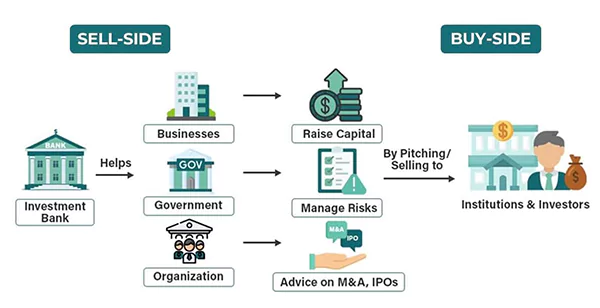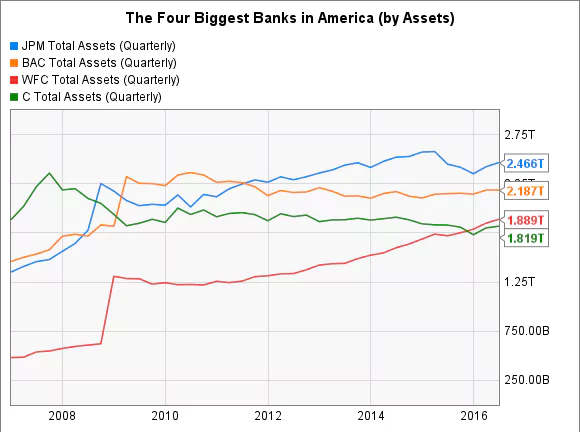
Investment banking, often seen as a distant and complex industry, significantly influences our daily lives in various ways. Beyond the confines of Wall Street, its reach extends into the heart of our economies, affecting how we save, invest, work, and consume.
An investment banking course provides you with the knowledge and skills to understand and navigate the intricacies of it, helping you make informed financial decisions in your everyday life. Now, let’s see its impact on your everyday life, dissecting its role in savings and retirement, homeownership, job creation, company growth, the stock market, access to credit, technological innovation, government policies, and ethical considerations.
Investment Banking and the Global Economy
To appreciate its influence on our lives, we must first acknowledge its fundamental role in the global economy. Investment banks serve as intermediaries, facilitating the flow of capital in financial markets. They enable businesses to raise funds for various purposes, including expansion, research and development, and innovation. When companies thrive, they create jobs, boost economic growth, and offer products and services that become integral parts of our daily lives.
Investment Banking and Your Savings
Its most direct impact on your everyday life lies in how it manages your savings. These banks help individuals allocate their funds to various assets, such as stocks, bonds, mutual funds, and other finances. The performance of these assets, often overseen by investment banks or affiliated firms, significantly influences your financial well-being, particularly in the context of retirement planning.
Individual retirement accounts (IRAs) and 401(k) plans are common vehicles for retirement savings managed by banks. These accounts typically include a mix of stocks, bonds, and other assets influenced by the financial decisions made by professionals in the industry. As such, it directly impacts your financial security in retirement.

Investment Banking and Homeownership
Homeownership is a cherished goal for many individuals and families. These banks play a vital role in making this dream a reality. They are involved in the creation of mortgage-backed securities (MBS), which facilitate the issuance of home loans. When banks bundle mortgages into securities and trade them in financial markets, they influence interest rates and the availability of housing loans.
This dynamic relationship between these banks and the housing market has a direct impact on your ability to purchase a home. When interest rates are low, homeownership becomes more affordable, but when they rise, the cost of financing a home increases, potentially making it more challenging for you to buy the home you desire.
Here’s a fun fact…
Investment bankers are often pictured as math and finance geeks but that’s not always the case. Because Less than 25% of investment bankers have a finance degree.
Investment Banking and Job Creation
It wields considerable influence over job creation and job loss through its involvement in mergers and acquisitions (M&A) transactions. When companies merge or acquire others, they often seek to streamline their operations, which can lead to layoffs. Conversely, successful M&A deals can result in the expansion of businesses, creating new employment opportunities for workers. Therefore, the job market you navigate is shaped in part by its activities.
Also, they facilitate the raising of capital for startups and growing businesses. When these companies secure funding, they can hire more employees, fostering employment growth and contributing to the overall employment landscape. In this way, they have a tangible impact on the availability of job opportunities in your community.
Investment Banking and Company Growth
They are instrumental in facilitating company growth. By helping businesses access the capital they need, they enable companies to expand their operations, innovate, and bring new products and services to the market. Even if it’s a tech startup raising funds for groundbreaking technology or an established corporation financing a new manufacturing facility, its services are integral to the growth and development of companies.
These investments drive innovation and create products and services that may become integral parts of your daily life. From the smartphone you use to the transportation you rely on, they play a significant role in bringing these advancements to market.
Investment Banking and the Stock Market
The stock market is a central component of the investment banking ecosystem. Investment banks underwrite initial public offerings (IPOs), helping companies go public and raise capital from investors. They also facilitate the trading of stocks, bonds, and other financial instruments. The performance of the stock market has a direct impact on your funds and retirement accounts, as well as the broader economy.
Market fluctuations can influence consumer confidence and spending habits. When the stock market performs well, people tend to feel more financially secure, which can lead to increased spending on goods and services. Conversely, a declining market can result in reduced consumer confidence, potentially affecting your daily purchasing decisions.
Investment Banking and Access to Credit
These banks are deeply involved in the issuance of corporate bonds, which provide businesses with a source of funding. The health of the bond market directly affects the availability and cost of credit for consumers. In case you’re looking to finance a car, start a small business, or obtain a credit card, the interest rates you encounter are influenced by the bond market, which these banks play a pivotal role in shaping.
When the bond market is robust and interest rates are favorable, you may find it easier and more affordable to access credit for various purposes. Conversely, during periods of economic uncertainty or market volatility, credit availability may tighten, affecting your ability to make significant purchases.
Did you Know?
J.P Morgan is the leading investment bank Globally with 9.6% of the world’s investment banking revenue followed by Goldman Sachs at 9%. Also, all five of the top investment banks globally are American multinational investment banking firms.

Investment Banking and Technological Innovation
The financial technology (FinTech) sector has experienced rapid growth in recent years, and investment banks have played a key role in funding and advising these startups. FinTech innovations have revolutionized how you manage your finances, offering a wide range of products and services that simplify and enhance everyday financial transactions.
Funds managing apps, online assets managing platforms, peer-to-peer payment systems, and digital wallets are just a few examples of FinTech innovations that have become integral parts of your daily life. These banks have contributed to the development and expansion of these technologies, making financial services more convenient and accessible to consumers.
Investment Banking and Government Policies
Government policies related to finance and the economy often intersect with investment banking. During economic crises, These banks may play a vital role in government bailouts and financial stability initiatives. Government regulators also oversee the industry, implementing rules and regulations that impact how they operate.
For example, after the 2008 financial crisis, governments around the world implemented stricter regulations to enhance the stability and transparency of the financial system. These regulations have had far-reaching effects, influencing the financial products and services available to you as a consumer and investor.
Conclusion
Investment banking is a powerful and multifaceted industry that significantly impacts your everyday life. From shaping your retirement savings and homeownership opportunities to influencing job creation, technological innovation, and ethical considerations, and pervasive. By understanding its role in the global economy and the choices you make as a consumer and investor, you can navigate the complexities of this industry and advocate for a financial system.